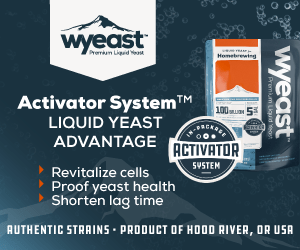How can I get better hop utilization?
TroubleShooting
Upping IBUs
I have been planning on making an extract oatmeal stout, but after entering all my ingredients into a recipe calculator I am concerned with my hop utilization. I boil my wort in about two gallons (8 L) of water and have noticed, through the recipe calculator, that as I add more sugars the hop utilization goes down. I plan on using six pounds of liquid malt extract and a pound or two of honey. If I add just the malt, it shows that I will have around 20 IBUs but if I were to add the honey to the boil that would lower it to about 16 IBUs. I have heard of brewers boiling their hops in plain water and adding the malt and sugars after they have boiled the hops for a while. Could you explain how I would go about getting better hop utilization without buying new equipment?
Adam Boyle
via e-mail
On the surface this may seem like an easy question. Since hop utilization decreases as wort gravity increases it seems logical that one solution to the dilemma faced by extract brewers who boil concentrated wort is to boil the hops separately. This may sound attractive but one downside to this is that the quality of the bitterness and the extraction of plant substances from the hops are reportedly different when hops are boiled in water compared to boiling in wort, and the differences are not for the better.
The difference between an expected bitterness of 16 versus 20 indicates a reduction in bitterness by 20%, meaning that one way to combat the issue is to increase the weight of bittering hops added to the boil by 24% (the additional hop addition also has a reduced utilization, so the increase to the recipe needs to be 24%). This will minimally increase the cost, maybe by a buck or so, of your ingredients. If you really want to keep your ingredient efficiency in line with all-grain brewing you still have a couple of other options.
The first option is to boil the hops in wort with a specific gravity in the neighborhood of 1.048, which is similar to the average gravity for a full-volume wort boil. You do not have to dilute all of your extract to this strength, just enough to give a decent ratio of wort to hops. I suggest using at least one gallon of wort per half ounce of hops because the solubility of iso-alpha acids in wort is limited and if the ratio is too low then your hop yield will suffer. You should boil the first hop addition for at least 60 minutes to get the best isomerization and during this time you don’t want to evaporate much more than about 10% of the wort volume.
When using malt extracts, the time required to boil the wort is not nearly as critical as with all-grain brewing because the wort has already been boiled during the production of the malt extract. You really only need about 20 minutes to make sure you kill anything that might be in the extract, meaning that you could add your extract to the boiling wort and hops towards the end of the 60 minute boil. If you do this you want to make sure the wort gravity is not excessively high. You could mix the bulk of your extract with water, get it boiling and then add the contents of your hop boil to it to make things flow easily. Remember that hops added late in the boil are primarily for aroma. Since isomerization is not required for extracting aroma this method should not reduce the contribution of late hops as compared to a full-volume wort boil.
In essence this method is nearly identical to the method you proposed, except the hops are being boiled in wort as opposed to water. Another method is to use two kettles to do a full-volume wort boil by splitting the volume into two easier to handle kettles. This will require more equipment (a second kettle) and allows you to easily boil the two pots on your kitchen stove. The beer in question contains a couple of pounds of honey and in this particular example you could hold off on adding the honey to the end of the boil. So you have a few options to address your dilemma without having to risk potential off-flavors associated from boiling hops in water!


